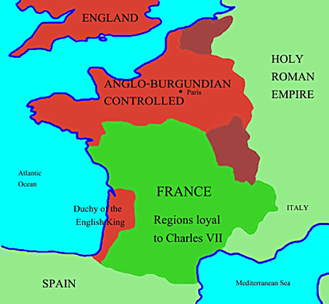Wool War I
Introduction |Keratin | Why Wool? | A Sheep Market | Wool War I |References
In the decades leading up to the Hundred Years War, a triangular trade developed between England, Flanders and southern France. In 1066, Norman invaders from northern France under the leadership of William the Conqueror, overthrew the existing monarchy and aristocracy in England and established a new rule. The Normans brought with them their love for wine. The English had traditionally drunk beer, since the English climate and geography is not suitable to the cultivation of grapes. The Normans then, were forced to import their cherished wines from southern France. The main English export, however, was wool. Southern France, being a predominantly agricultural region, had little use or need for unprocessed wool. They did, however, import manufactured cloth from Flanders in the North. The Flemish, while having an extensive cloth manufacturing industry, needed to import much of their raw material, wool, and often imported wool from England. Thus, the Flemish sold processed woolen cloth to southern France in return for wine which was used to trade for wool from England.
 |
| |
|
| |
|
This triangular trade which was sustained by wool continued for decades to the benefit of each of the three regions. Soon, however, the French monarchy began consolidating its control over France, which posed a threat to the balance of trade. The French Kings were especially interested in regaining control over the province of Flanders. The Flemish had always been vassals of the French king, but taking advantage of his previous weakness, they had acted independently, amassing great wealth through the wool trade with England. As the French monarchy strengthened, however, they wished to reestablish their authority over the Flemish to gain control of the profitable wool trade. The English, while having strong economic ties with Flanders, often fought the French kings over the large tracts of land that the English control in southern France. The growing power of the French monarchy posed a threat to the economic stability of England and the English were determined to prevent the French from taking control of Flanders. Thus when the civil war between pro-French and anti-French factions broke out in Flanders, the English supported the anti-French merchant class. The conflict, coupled with other Anglo-French tensions, soon escalated into war between England and France, which would last for 116 years.
Tags: Keratin

